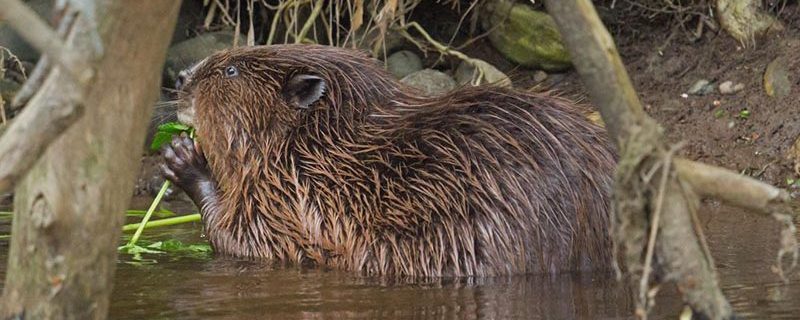
The Necessary Beaver
An exciting conference hosted by the Scottish Wild Beaver Group will be held in the heart of Scotland on the 28th March 2015 exploring the history and ecology of the beaver, their role in biodiversity and wetland management and how they can help us in flood prevention and ecotourism.
2015 will be a landmark year for the Scottish wild beaver as following the five year Scottish Beaver Trial the Scottish Government will make its decision later in 2015 on the reintroduction of this iconic species which was hunted to extinction some 400 years ago. This is part of the Scottish Government’s obligation under the 1984 European Habitats Directive to look into the reintroduction of extinct native species where feasible.
We have a fantastic range of speakers who have kindly agreed to come and talk at our conference:
– Nick Dixon from the Scottish Crannog Centre will be talking about beavers in archaeology
– Victor Clements will be discussing the observations over the past four years of the impacts of the wild beavers on riparian woodland on the Upper Tay around Aberfeldy
– Nigel Wilby and Alan Law from Stirling University on the results of a two year study into the impacts of beavers that beavers have had on the biodiversity of Bamff Estate in Perthshire
– Pieter Noordanus from the Netherlands will show how the landowners, farmers and government worked out the “Ruimte voor de Rivier plan”. Beavers were reintroduced to the Netherlands in the late 1980’s and are a management factor in the “Room for the River Plan”, which is a huge flood management plan to safeguard the low lying ground of the Netherlands (some 4 million people) from flooding by various measures such as relocation of dykes to create larger flood plains, lowering the level of the floodplains to hold more water, temporary storage locations for times of high rainfall runoff and strengthening dykes in areas where it is not possible to create more room for the river.
– Sir Charles Burrell will talk about practical rewilding on his Knepp Estate in Sussex, which in 2001 moved away from traditional dairy and arable farming to less intensive quality meat production and became a pioneer in ecological land management, rewilding unproductive agricultural land into beneficial wildlife conservation areas.
– Bob Smith from the SWBG will show what economic benefits wild beavers have brought to East Perthshire as a tourist attraction with 77% of visitors coming to view the beavers from outside Scotland. He has also toured the local schools giving presentations on beavers which have encouraged children to appreciate and enjoy their local wildlife.
– Liz Halliwell is joining us from the Welsh Beaver Project who are investigating the feasibility of reintroducing beavers into Wales and are hoping to reintroduce beavers into a couple of sites in 2015.
– Uwe Stoneman, Tayside Reserves Manager for the RSPB who will talk about managing the RSPB Nature Reserve Loch of Kinnordy in the North East of Scotland which has a resident population of wild beavers.
– Peter Smith is an ecologist who founded the Wildwood Trust which was created to champion British wildlife education, re-introduction and practical “re-wilding”, including the use of beavers and wild horses to create semi wild habitats. He is also an avid campaigner in the area of the political economy of ecological restoration and will take us on a quick journey into the emerging world of environmental economics and ecosystem services– where many of the benefits go unrecognised and much of the cash costs cause fear and opposition to the return of wildlife.
– Mark Elliott from the Devon Wildlife Trust is a wetland ecologist who will provide an overview of the current situation with beavers in Devon, where the Devon Wildlife trust has been running a captive beaver Trial since 2010, and has currently a licence application pending for the first unfenced trail in England on the River Otter. He will also talk about their plans over the next 5 years to monitor the impacts of a wild living population in a lowland English river, and address any conflicts that arise.
– Sir John Lister-Kaye OBE from the Aigas Field Centre near Beauly will round off our day with his thoughts on the future of beavers in our modern world
The finale of the conference will be a panel question time for the questions on your mind!
Sunday 29th March 2015
By kind permission of Paul and Louise Ramsay, a guided walk will be arranged if sufficient interest around the beaver lodges and dams on their estate near Alyth in north eastern Perthshire which is around 16 miles from Dunkeld. Over the last 30 years the Ramsays have planted many acres of woodland, mostly of native species, and recreated many acres of wetland by the re-introduction of some European beavers, which are now breeding successfully in large enclosures. This project was the first of its kind in the UK. The beavers are helping to create a ribbon lake along the ditch that drains the flat ground around the house. Paul also keeps a herd of wild boars in the woods. Directions can be found on their website http://www.bamff.co.uk/
The walk is from 10.30 – 12.30 am – please approach by the front drive (the entrance nearer Alyth) and go straight on when you see the house, parking in front of it.

